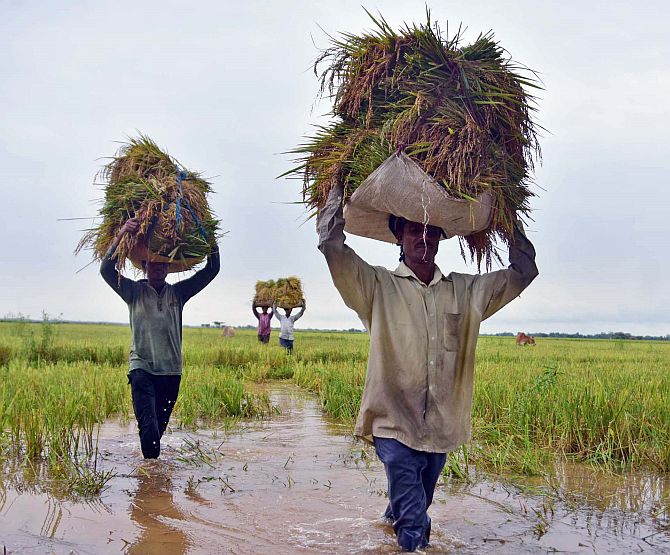The government has also extended till August 31 the repayment date of short-term crop loan of up to Rs 3 lakh for agriculture and allied activities. The decision, taken by the Cabinet headed by Prime Minister Narendra Modi, will give respite to farmers and also help them take a call on which kharif (summer) crop to grow as sowing picks up with the arrival of southwest monsoon.

The government on Monday raised the minimum support price (MSP) of paddy marginally by Rs 53 per quintal to Rs 1,868 per quintal for the 2020-21 crop year, while the rates for oilseeds, pulses and cereals were hiked substantially.
Among commercial crops, the MSP of cotton was increased by Rs 260 per quintal to Rs 5,515 for medium staple variety, and by Rs 275 per quintal to Rs 5,825 for long staple variety of cotton for the current crop year (July-June).
The government has also extended till August 31 the repayment date of short-term crop loan of up to Rs 3 lakh for agriculture and allied activities.
The decision, taken by the Cabinet headed by Prime Minister Narendra Modi, will give respite to farmers and also help them take a call on which kharif (summer) crop to grow as sowing picks up with the arrival of southwest monsoon.
Paddy is the main kharif crop, the sowing of which has already begun and covered in 35 lakh hectare so far.
The Met Department has projected normal monsoon for the June-September period.
"Based on the recommendation of Commission for Agricultural Costs and Prices (CACP), the Cabinet has approved MSP of 14 kharif crops for 2020-21.
“Farmers would get 50-83 per cent higher return over the cost of production," Agriculture Minister Narendra Singh Tomar told the media after the meeting.
The Centre has increased the MSP of kharif crops for 2020-21 crop year in line with the principle of fixing MSPs at a level which is at 1.5 times the cost of production that was announced in 2018-19, he said.
The government has raised paddy MSP for both common and A grade varieties by Rs 53 per quintal for the 2020-21 over the last year.
Accordingly, the MSP of paddy (common grade) has been fixed at Rs 1,868 per quintal, while that of A grade variety has been raised to Rs 1,888 for this year.
The paddy MSP fixed is 50 per cent higher than the cost of production at Rs 1,245 per quintal (common) and Rs 1,746 per quintal (A grade), the minister added.
Among cereals, the government increased substantially the support price of bajra by Rs 640 per quintal to Rs 2,640 per quintal for this year.
The MSP of ragi has been raised by Rs 145 per quintal to Rs 3,295 per quintal and that of maize by Rs 90 per quintal to Rs 1,850 per quintal for the current year.
Similarly, the support price of jowar has been increased by Rs 70 per quintal for this year. The MSP for hybrid maize has been fixed at Rs 2,620 per quintal and Maldandi variety of maize at Rs 2,640 per quintal for 2020-21.
To encourage production of pulses, the government has increased the MSP of urad by Rs 300 per quintal to Rs 6,000 per quintal, while that of tur rate has been raised by Rs 200 per quintal to Rs 6,000 per quintal for this year.
The MSP of moong has also been increased by Rs 146 per quintal to Rs 7,196 per quintal for this year, an official statement said.
In order to reduce edible oil imports, the government has increased the MSP of oilseeds crops sharply for this year.
Soyabean (yellow) rate has been hiked by Rs 170 per quintal to Rs 3,880 for the current 2020-21 crop year, while that of sunflower seed has been raised by Rs 235 to Rs 5,885 and groundnut by Rs 185 to Rs 5,275 per quintal.
However, the Nigerseed rate has been hiked substantially by Rs 755 per quintal to Rs 6,695 for 2020-21 and sesamum seed by Rs 370 per quintal to Rs 6,855.
According to the government, the expected returns to farmers over their cost of production are estimated to be highest in case of Bajra (83 per cent) followed by urad (64 per cent), tur (58 per cent) and maize (53 per cent).
For the rest of the crops, return to farmers over their cost of production is estimated to be at least 50 per cent.
Concerted efforts were made over the last few years to realign the MSPs in favour of oilseeds, pulses and coarse cereals to encourage farmers to shift to larger areas under these crops and adopt best technologies and farm practices, to correct demand - supply imbalance, it said.
The added focus on nutri-rich nutri-cereals is to incentivise its production in the areas where rice and wheat cannot be grown without long term adverse implications for groundwater table, it added.
Govt approves Rs 50K crore equity infusion for MSMEs
On the MSMEs, Union Minister Prakash Javadekar said the decision on equity infusion will also enable micro, small and medium enterprises to get listed on stock exchanges.
A fund of funds with cropus of Rs 10,000 will be set up. The fund of funds will be operated through mother fund and few daughter funds.
The fund structure will help leverage Rs 50,000 crore of funds at daughter funds level.
The subordinate debt for stressed MSMEs is likely to benefit 2 lakh stressed MSMEs.
Meanwhile, the government further amended the definition of MSME. The turnover limit for medium enterprises has been revised upward to Rs 250 crore (from Rs 100 crore as announced earlier).
Photograph: Anuwar Hazarika/ANI Photo











 © 2025
© 2025